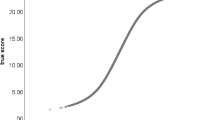Abstract
‘Food and drinks’ is a thematic content known not to produce differential performance to abstract content on the Wason selection task. To examine the effects of context on problem responses, this content was set in a ‘diet’ context, predicted to produce differential performance, and this context was compared both with the ‘food and drinks’ presentation previously used and with abstract content. Additionally, both conditional and universal rules were used, producing six cells to the design, 12 subjects being tested in each cell. Results revealed a significant difference between the rules (in the form a rule by content interaction), content having a significant effect only when the conditional rules were used. For these rules, subjects made significantly more correct solutions in the diet condition than in the abstract condition, whereas there was no evidence of differential performance between the (other) thematic and the abstract condition. Although it is admitted that no satisfactory explanation of the rule differences seems apparent, the effect of context observed is encouraging for this line of research. It is concluded that, as subjects are shown to be capable of coding the general idea of a counter-example into relevant specific selections, they are quite capable of solving the task, but that they fail to do so unless the solution is cued by, and its outcome would be consistent with, their pre-existing belief structures.
Similar content being viewed by others
References
Ajzen, I. (1977). Intuitive theories of events and the effects of base-rate information on prediction. Journal of Personality and Social Psychology, 35, 303–314.
Baker, R.J. & Nelder, J.A. (1978). The GLIM System: Release 3. Oxford: Numerical Algorithms Group.
Bracewell, R.J. & Hidi, S.E. (1974). The solution of an inferential problem as a function of stimulus materials. Quarterly Journal of Experimental Psychology, 26, 480–488.
Brown, C., Keats, J.A., Keats, D.M. & Seggie, I. (1980). Reasoning about im plication: a comparison of Malaysian and Australian subjects. Journal of Cross-Cultural Psychology, 11, 395–410.
Chapman, L.J. (1967). Illusory correlation in observational report. Journal of Verbal Learning and Verbal Behavior, 6, 151–155.
Chapman, L.J. & Chapman, J.P. (1967). Genesis of popular but erroneous psychodiagnostic observations. Journal of Abnormal Psychology, 73, 193–204.
Chapman, L.J. & Chapman, J.P. (1969). Illusory correlation as an obstacle to the use of valid psychodiagnostic signs. Journal of Abnormal Psychology, 74, 271–280.
Cohen, L.J. (1981). Can human irrationality be experimentally demonstrated? Behavioral and Brain Sciences, 4, 317–331.
Evans, J. St. B. T. (1972). Interpretation and matching bias in a reasoning task. Quarterly Journal of Experimental Psychology, 24, 193–199.
Evans, J.St.B.T. (1977). Towards a statistical theory of reasoning. Quarterly Journal of Experimental Psychology, 29, 621–635.
Feather, N. T. (1964). Acceptance and rejection of arguments in relation to attitude strength, critical ability and intolerance of inconsistency. Journal of Abnormal and Social Psychology, 69, 127–136.
Gilhooly, K.J. & Falconer, W.A. (1974). Concrete and abstract terms and relations in testing a rule. Quarterly Journal of Experimental Psychology, 26, 355–359.
Goodman, L.A. (1971). The analysis of multidimensional contingency tables: stepwise procedures and direct estimation methods for building models for multiple classification. Technometrics, 13, 33–61.
Gordon, R. (1953). The effect of attitudes toward Russia on logical reasoning. Journal of Social Psychology, 37, 103–111.
Griggs, R.A. & Cox, J.R. (1982). The elusive thematic-materials effect in Wason's selection task. British Journal of Psychology, in press.
Janis, I. & Frick, F. (1943). The relationship between attitudes toward conclusions and errors in judging logical validity of syllogisms. Journal of Experimental Psychology, 33, 73–77.
Johnson-Laird, P.N. & Wason, P.C. (1970). Insight into a logical relation. Quarterly Journal of Experimental Psychology, 22, 49–61.
Johnson-Laird, P.N., Legrenzi, P. & Legrenzi, M.S. (1972). Reasoning-and a sense of reality. British Journal of Psychology, 63, 395–400.
Kaufman, H. & Goldstein, S. (1967). The effects of emotional value of conclusions upon distortions in syllogistic reasoning. Psychonomic Science, 7, 367–368.
Lunzer, E.A., Harrison, C. & Davey, M. (1972). The four card problem and the generality of formal reasoning. Quarterly Journal of Experimental Psychology, 24, 326–339.
Manktelow, K.I. & Evans, J.St.B.T. (1979). Facilitation of reasoning by realism: effect or non-effect? British Journal of Psychology, 70, 477–488.
Nelder, J.A. (1974). Log linear models for contingency tables: a generalization of classical least squares. Applied Statistics, 23, 323–329.
Pollard, P. (1981). The effect of thematic content on the ‘Wason selection task’. Current Psychological Research, 1, 21–29.
Pollard, P. (1982). Human reasoning: some possible effect of availability. Cognition, 12, 65–96.
Pollard, P. & Evans J. St.B.T. (1981). The effects of prior beliefs in reasoning: an associational interpretation. British Journal of Psychology, 72, 73–81.
Reich, S.S. & Ruth, P. (1982). Reasoning: verification, falsification and matching. British Journal of Psychology, in press.
Tversky, A. & Kahneman, D. (1980). Causal schemata in judgements under uncertainty. In M. Fishbein (ed.), Progress in Social Psychology. Hillsdale, NJ: Erlbaum.
Van Duyne, P.C. (1974). Realism and linguistic complexity in reasoning. British Journal of Psychology, 65, 59–67.
Van Duyne, P. C. (1976). Necessity and contingency in reasoning. Acta Psychologica, 40, 85–101.
Wason, P.C. (1966). Reasoning. In B. Foss (ed.), New Horizons in Psychology. London: Penguin.
Wason, P.C. (1968). Reasoning about a rule. Quarterly Journal of Experimental Psychology, 20, 273–281.
Wason, P.C. (1969). Regression in reasoning? British Journal of Psychology, 60, 471–480.
Wason, P.C. & Johnson-Laird, P.N. (1970). A conflict between selecting and evaluating information in an inferential task. British Journal of Psychology, 61, 509–515.
Wason, P.C. & Johnson-Laird, P.N. (1972). Psychology of reasoning: structure and content. Lon don: Batsford.
Vason, P.C. & Shapiro, D. (1971). Natural and contrived experience in a reasoning problem. Quarterly Journal of Experimental Psychology, 23, 63–71.
Author information
Authors and Affiliations
Rights and permissions
About this article
Cite this article
Pollard, P., Gubbins, M. Context and rule manipulations on the Wason selection task. Current Psychological Research 2, 139–149 (1982). https://doi.org/10.1007/BF03186754
Accepted:
Published:
Issue Date:
DOI: https://doi.org/10.1007/BF03186754




